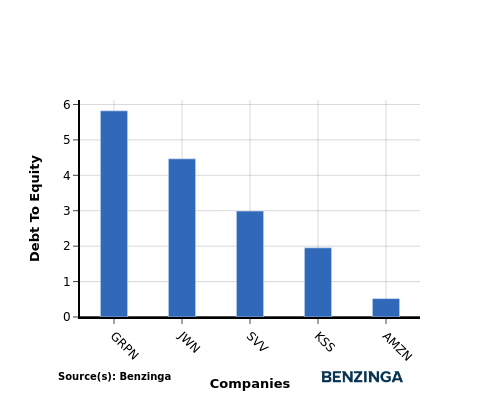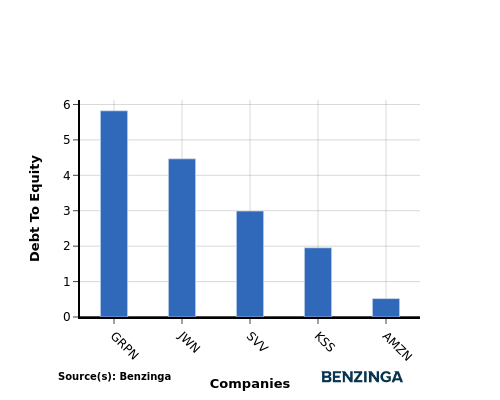In today's rapidly changing and highly competitive business world, it is vital for investors and industry enthusiasts to carefully assess companies. In this article, we will perform a comprehensive industry comparison, evaluating Amazon.com AMZN against its key competitors in the Broadline Retail industry. By analyzing important financial metrics, market position, and growth prospects, we aim to provide valuable insights for investors and shed light on company's performance within the industry.
Amazon.com Background
Amazon is the leading online retailer and marketplace for third party sellers. Retail related revenue represents approximately 75% of total, followed by Amazon Web Services' cloud computing, storage, database, and other offerings (15%), advertising services (5% to 10%), and other the remainder. International segments constitute 25% to 30% of Amazon's non-AWS sales, led by Germany, the United Kingdom, and Japan.
| Company | P/E | P/B | P/S | ROE | EBITDA (in billions) | Gross Profit (in billions) | Revenue Growth |
|---|---|---|---|---|---|---|---|
| Amazon.com Inc | 42.12 | 8 | 3.40 | 6.19% | $32.08 | $31.0 | 11.04% |
| Alibaba Group Holding Ltd | 17.09 | 1.51 | 1.55 | 4.64% | $54.02 | $92.47 | 5.21% |
| PDD Holdings Inc | 9.85 | 3.61 | 2.86 | 9.38% | $29.18 | $59.65 | 44.33% |
| MercadoLibre Inc | 71.12 | 25.40 | 5.56 | 10.37% | $0.72 | $2.44 | 35.27% |
| JD.com Inc | 11.14 | 1.59 | 0.35 | 5.22% | $15.92 | $45.04 | 5.12% |
| Coupang Inc | 42.75 | 10.44 | 1.51 | 1.74% | $0.28 | $2.27 | 27.2% |
| eBay Inc | 15.93 | 5.59 | 3.14 | 11.59% | $0.95 | $1.85 | 3.04% |
| Vipshop Holdings Ltd | 6.30 | 1.31 | 0.47 | 2.76% | $1.47 | $4.96 | -9.18% |
| Dillard's Inc | 11.51 | 3.61 | 1.08 | 6.37% | $0.15 | $0.58 | -4.19% |
| Ollie's Bargain Outlet Holdings Inc | 28.84 | 3.65 | 2.64 | 3.14% | $0.08 | $0.22 | 12.41% |
| MINISO Group Holding Ltd | 16.76 | 3.89 | 2.73 | 6.26% | $0.79 | $1.77 | 24.08% |
| Macy's Inc | 25.08 | 1.05 | 0.19 | 3.53% | $0.44 | $2.16 | -3.48% |
| Nordstrom Inc | 13.43 | 4.03 | 0.26 | 13.68% | $0.4 | $1.49 | 3.23% |
| Kohl's Corp | 6.68 | 0.49 | 0.11 | 1.73% | $0.35 | $1.6 | -4.18% |
| Savers Value Village Inc | 19.85 | 3.37 | 1 | 5.09% | $0.07 | $0.22 | 0.53% |
| Groupon Inc | 13.51 | 9.27 | 0.69 | 34.72% | $0.03 | $0.1 | -9.48% |
| Average | 20.66 | 5.25 | 1.61 | 8.01% | $6.99 | $14.45 | 8.66% |
By analyzing Amazon.com, we can infer the following trends:
-
The current Price to Earnings ratio of 42.12 is 2.04x higher than the industry average, indicating the stock is priced at a premium level according to the market sentiment.
-
The elevated Price to Book ratio of 8.0 relative to the industry average by 1.52x suggests company might be overvalued based on its book value.
-
The Price to Sales ratio of 3.4, which is 2.11x the industry average, suggests the stock could potentially be overvalued in relation to its sales performance compared to its peers.
-
With a Return on Equity (ROE) of 6.19% that is 1.82% below the industry average, it appears that the company exhibits potential inefficiency in utilizing equity to generate profits.
-
The company exhibits higher Earnings Before Interest, Taxes, Depreciation, and Amortization (EBITDA) of $32.08 Billion, which is 4.59x above the industry average, implying stronger profitability and robust cash flow generation.
-
The gross profit of $31.0 Billion is 2.15x above that of its industry, highlighting stronger profitability and higher earnings from its core operations.
-
The company's revenue growth of 11.04% is notably higher compared to the industry average of 8.66%, showcasing exceptional sales performance and strong demand for its products or services.
Debt To Equity Ratio

The debt-to-equity (D/E) ratio assesses the extent to which a company relies on borrowed funds compared to its equity.
Considering the debt-to-equity ratio in industry comparisons allows for a concise evaluation of a company's financial health and risk profile, aiding in informed decision-making.
When assessing Amazon.com against its top 4 peers using the Debt-to-Equity ratio, the following comparisons can be made:
-
Amazon.com is in a relatively stronger financial position compared to its top 4 peers, as evidenced by its lower debt-to-equity ratio of 0.52.
-
This implies that the company relies less on debt financing and has a more favorable balance between debt and equity.
Key Takeaways
For Amazon.com, the PE, PB, and PS ratios are all high compared to its peers in the Broadline Retail industry, indicating that the stock may be overvalued. The low ROE suggests that Amazon.com is not generating significant returns on shareholder equity. However, the high EBITDA, gross profit, and revenue growth show that the company is performing well in terms of operational efficiency and revenue generation compared to its industry peers.
This article was generated by Benzinga's automated content engine and reviewed by an editor.
© 2024 Benzinga.com. Benzinga does not provide investment advice. All rights reserved.








